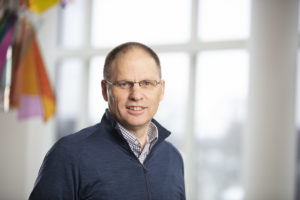Gift establishes the Sobel Professorship in Radiation Oncology at the Wilmot Cancer Institute
Gift establishes the Sobel Professorship in Radiation Oncology at the Wilmot Cancer Institute

Dr. Sidney Sobel and his wife, Barbara Sobel
A gift from Dr. Sidney Sobel ’73M (FLW) and his wife, Barbara, recently established the Dr. Sidney H. and Barbara L. Sobel Professorship in Radiation Oncology at the Wilmot Cancer Institute at the University of Rochester Medical Center (URMC).
The professorship will support an accomplished Wilmot faculty member who is dedicated to advancing radiation oncology research and education. Brian Marples, PhD, has been named the inaugural recipient of this professorship. Marples is an internationally renowned radiation biologist and nationally recognized educator whose research focuses on normal tissue toxicity.
“Making this gift is very meaningful to Barbara and me—it will support excellence in radiation oncology at the University, in a field and place that have meant so much to me,” says Dr. Sobel. “We are especially pleased that Brian Marples will be the first recipient.”
“This is such a generous gift—one that will forever benefit radiation oncology research, Wilmot, and our patients,” says Dr. Jonathan Friedberg, director of the Wilmot Cancer Institute. “The professorship not only honors Dr. Sobel’s many contributions here—it will help us recruit and retain world-class cancer researchers and educators like Dr. Marples. We are tremendously grateful to the Sobels for their leadership within the community and their ongoing support of our institution.”
“I am very proud to be the first person to hold this named professorship,” says Dr. Marples. “Along with my own work, this professorship broadly honors the radiation oncology department and Wilmot’s commitment to excellence in research, teaching, and clinical care. This gift will have a long-lasting impact because it secures a strong foundation for radiation and radiation biology research at URMC.”
The radiation oncology department at the Wilmot Cancer Institute is nationally recognized as one of the leading institutions in technology, treatment, and research in radiation and cancer biology. Its clinicians combine sophisticated medical physics and advanced knowledge in cancer and radiation biology to enhance radiation treatment efficacy, accuracy, and precision, which improves cancer control and the quality of life for cancer patients.

Brian Marples, PhD, the Dr. Sidney H. and Barbara L. Sobel Professor in Radiation Oncology at the Wilmot Cancer Institute
“Dr. Sobel has made an indelible impact on cancer patient care in the Rochester community during his time as a clinical associate professor here,” adds Dr. Yuhchyau Chen, radiation oncology department chair and a colleague who worked with Sobel for more than 20 years. “We will always honor his commitment to this department and to our patients.”
Dr. Sobel has enjoyed a varied career. Forty years ago, he was practicing vascular surgery in Maine when he severely injured his back in an accident that set his career on a different path. It led him to take a fellowship in multidisciplinary oncology at URMC, during which he hoped to recover from his injury. When his back injury failed to mend, he chose to retrain in radiation oncology, a field that drew on many of his surgical skills.
In 1981, after practicing radiation oncology at Highland Hospital for seven years, Dr. Sobel was appointed associate professor of radiation oncology at URMC. He also became chief of radiation oncology at Genesee Hospital, where he established his practice, Genesee Radiation Oncology. In 1985, he built a treatment facility, Finger Lakes Radiation Oncology Center, in Clifton Springs to serve cancer patients from outlying, rural areas, who, without local access, might not otherwise have received radiation treatment. In 1989, he built Batavia Radiation Oncology Center in Batavia, and in 1993, a cancer treatment center in Hornell.
“It has been very fulfilling for me as the developer of these rural cancer treatment facilities, and as a provider of professional services, to see them continuing in the University of Rochester and the Rochester Regional Health systems,” adds Dr. Sobel. “But, perhaps most gratifying has been the support of my wife, Barbara, in all these endeavors, and the many exceptional people who joined me in my work over the years.”
Gifts like these help University of Rochester faculty researchers advance knowledge and drive innovation. With federal research funding decreasing and competition for dollars growing, philanthropy plays an increasingly important role in their work. Support faculty research and learn more about how to make the world better through our Together for Rochester campaign.
—Kristine Thompson, April 2021